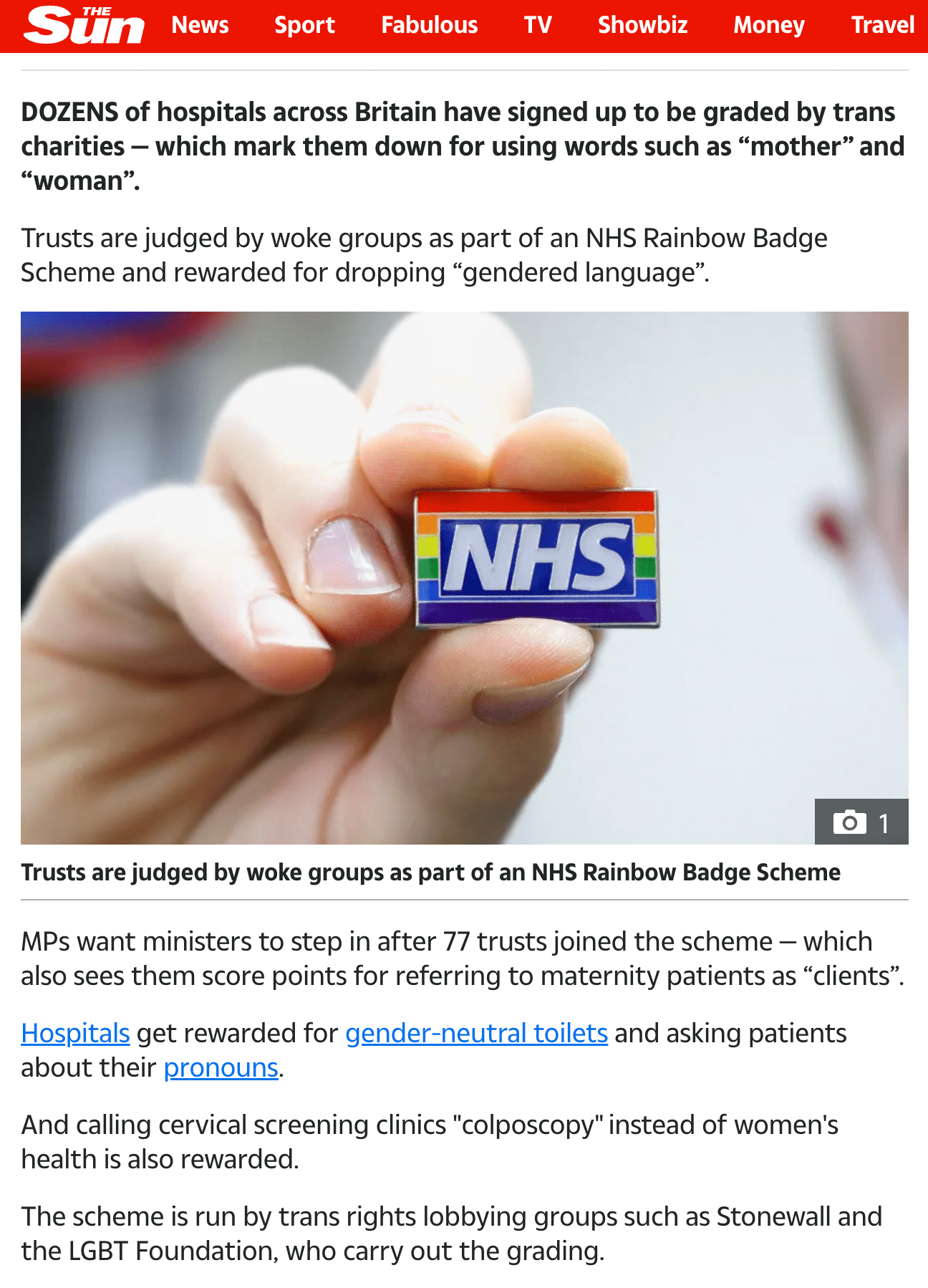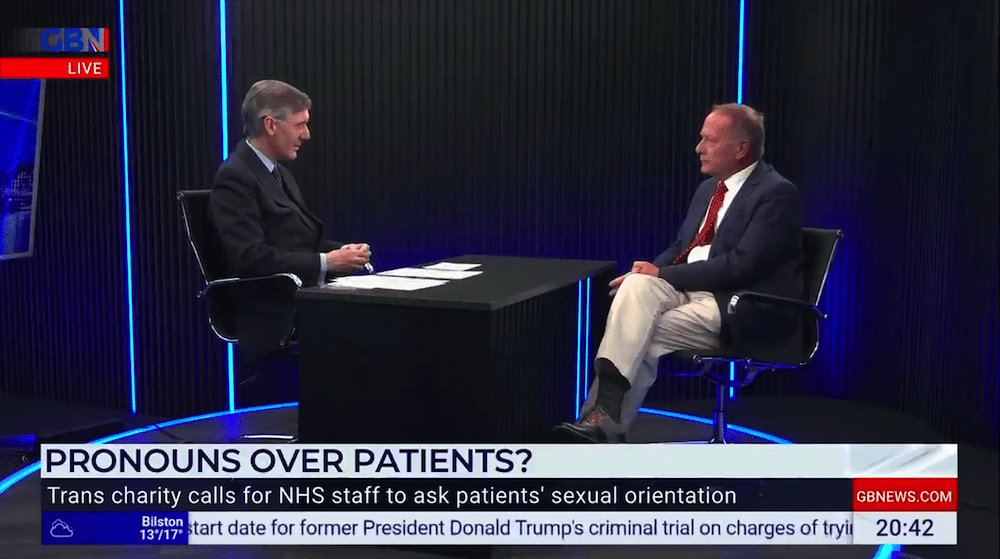ESG vs. Wokery as NHS hospitals accused of erasing women
In August 2023, various UK national newspapers picked up the story about how Stonewall and the LGBT Foundation are grading hospitals for their use (or perceived mis-use) of language which infers gender. Here at ESG PRO Limited we see this as a retrograde step which flies in the face of the very principles of ESG (Environment, Social, Governance), and we’ve gone on national television to discuss this live on air with Jacob Rees-Mogg on GB NEWS (watch the debate here).
Fact: ESG is Anti-Woke
Any commentary on this entire topic is not without a degree of risk, but as we see it there is a movement to stifle debate and to condemn those who don’t buy into whatever mantra is being sold. Take, for example, the real reasons why NatWest approached the de-banking of Nigel Farage: it was a clear breach of his privacy, followed by censorship because a delicate flower assumed his personal views conflicted with theirs.
We argue that not only does ESG protect the very demographic for whom these charities are campaigning, but by inventing their own grading system they are likely to disenfranchise that same group. The bottom line is simple: ESG is not about wokery, and militant Critical Social Justice is becoming exceptionally harmful to our society.
Before we explore the risks of such radicalism and censorship, here’s a snapshot of the article published in THE SUN so you can understand the full context:

What is Critical Social Justice?
Critical Social Justice is an censoring approach to campaigning which was derived from the much-discredited Critical Race Theory which became so popular in the USA. On the face of it, you might expect its roots are to found in tolerance and acceptance, whereas in reality it openly attacks our society’s norms. The insidious approach is used by the vocal minority to dress up their attacks as social justice and the dreaded DEI, aka Diversity, Inclusion and Equality (or Equity, as some proponents would have it).
It would be delightful, except for the corporate Groupthink which then follows, as marketing and PR teams become consumed by targeting the Gen Z demographic and the hopelessly sensitive Generation Alpha (those born between 2010- 2024). That the NHS has swallowed this logic is unsurprising, run as it is by a London-centric clique. Any senior manager or board member who is inclined to object is branded as unacceptable and urged to “move on”.

How Critical Social Justice has hijacked ESG
Environment, Social and Governance has existed as a globally important mainstream approach to managing impact investment since Kofi Annan first spoke of it at the UN General Assembly in New York in 2004. In summary, it offered a mechanism for investors to measure the impact of their investments as to how they might impact all aspects of society.
Environment is more than Net Zero
Under the NHS (and so many large corporations and public bodies) the new wokery rules. ESG’s environmental pillar now means little more than the absurd quest for the United Kingdom to sprint towards being a Net Zero economy. The ambition of Net Zero is commendable and ESG PRO is active in helping corporations to reduce their emissions. But there is so much more to the environmental pillar than emissions (such as water and effluents, easte, biodiversity, and so on ad nauseum).
Social is more than gender ideology
The Social pillar has been usurped too. Suddenly, the NHS, our police, local governments and beyond are preoccupied only with gender ideology. Why do they refuse to prioritise or discuss the unfair labour practises to which they subject their own staff (thinking here of their nurses, junior doctors, and students of all medical professions)? Indeed, the social pillar of ESG extends across every aspect of employee welfare, local communities, customer health, training and education, and so many more. Diversity is but a single thread and it is absolutely not – as many would have you believe – the dominant consideration.
Governance is more than gender based ideology
While the NHS is pouring vast sums into recruiting “DEI officers”, front line services are falling apart. The promotion of gender-based ideology is how we have reached a situation in which “wokery” is dictating medical terminology. This is not healthy for society, because hospitals should report across all social and governance topics.
Of course no discussion of NHS governance via an ESG lens should ignore how the NHS procurement system penalises our nation’s small businesses. The reality is that they have fixated upon another “closed shop” metric known as the TOMS framework which claims to deliver “social value reporting”. Unsurprisingly, this doesn’t work, and it penalises smaller businesses which have taken a comprehensive approach and which have addressed the entire range of material topics.
The Trans Lobby and mental health claims
The directors of ESG PRO have acute and very personal awareness of both childhood and adult mental health issues, and here again the Critical Social Justice campaigners are distorting reality. Let’s focus on the Tavistock clinic to explain, because the corruption of ESG concepts becomes self-evident.
The service at the heart of the Cass Review, the Tavistock GIDS, has contributed to the vocal reactions with a statement that unveils its ideological stance. Phrases such as “vulnerable marginalised individuals” and rallying cries like “Now is the moment to support trans and gender diverse individuals” sound more like the rhetoric of a political manifesto than the neutral reflections of healthcare experts.
Employing politically-charged terminology such as “being trans or cis, or any other gender identity” to describe children would likely receive commendation from Stonewall as an appropriate adult perspective on children. It would be interesting if Tavistock could clarify their definitions of a “trans child” or a “cis child”.
However, the Cass review has highlighted that the many co-morbidities of their young patients included anxiety, depression, easting disorders, and so forth. However, it noted that gender confusion stems from these issues and no vie versa.
Summarising this sub-topic, we reject the idea that a single topic reporting framework for NHS hospitals has merit. The science offered by these special interest groups is fundamentally flawed, and the existing ESG reporting frameworks (most prominently being that of the Global Reporting Institute, the GRI) is far superior precisely because it is both broad in scope and balanced.
Beware linguistic censorship
Of the many despicable fascists of the 20th Century, Benito Mussolini was surely one of the worst. His line, declared in speeches across fascist Italy: “O con noi o contro di noi”—You’re either with us or against us. And so it is in 2023 with the Stonewall activists and the LGBT Foundation who have declared war on the freedom of speech and expression.
Their schemes to drop gendered language (such as ‘mother’) are efforts to limit our freedom of speech and expression, which is an important aspect of governance and individual rights. and which are entirely contrary to the principles of ESG. By implementing a strict language grading system, they – and the NHS – are taking society down a route which will lead to backlash and division across our society.
Some individuals may resist what they perceive as linguistic censorship, which could lead to polarisation and hinder constructive dialogue on important social issues but a rigid language system will deliver unintended consequences. For example, it may well lead to avoidance of discussions related to gender or sex, potentially hindering progress in areas like women’s health research, or gender-specific medical needs.
The potential for the abuse of language grading systems
Grading systems focused on language use will divert attention from more substantive issues. By prioritising symbolism over substance, we will see an increase in healthcare disparities, while ensuring equal access to services, and improving overall patient care, should be higher priorities within the healthcare system.
There might be concerns about the potential for misuse or overzealous enforcement of language grading systems.
It may lead to situations where individuals or organisations are unfairly penalised for minor language infractions, potentially undermining trust in the grading system.
Stakeholder engagement is a key governance factor for any organisation, and some stakeholders, including those who have concerns about the implications of such a language grading system, might feel alienated or disengaged from hospitals that adopt such a system – this could have negative implications for overall governance and social cohesion.
These badges are not progress
Debating the theme of wokery with Jacob Rees-Mogg on live television was revelatory. The conflict in our society has become one of polarised opinion. The danger is that the very real progress made by so many quality organisations to improve their ESG standards and to deliver universal equality is being undermined.
We are knee-deep in an era of dogma in which the voices of a loud minority are causing a backlash which is disenfranchising the very people who its fame-hungry proponents profess to support.
The casualties of this war on reasonableness includes the opinions of people across our society who have demonstrated the best of Britishness: tolerance, acceptance, and respect. Companies too are at risk of being less inclined to deliver action, and this has the potential to reinforce discriminatory practises.
In summary, we reject the Critical Social Justice proponents and we will continue to advise clients to adopt only those policies and approaches which are reasonable, mature, and which have been proven to be genuinely effective over time.
